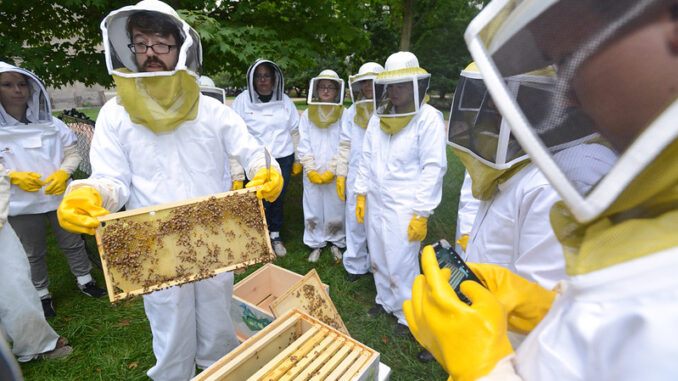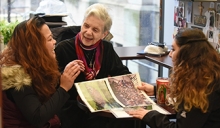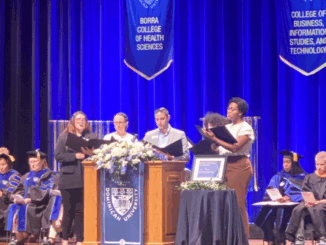
By Daniela Tovar-Miranda
Dominican is offering a hands on honors interdisciplinary course for honors students where students will be able to work with beehives on campus to learn about the connections of science topics to everyday life.
The course which will be taught during the Fall 2021 semester is called “Darwinian Thinking Across Discipline Human Being And Natural Being” and will be co-taught by english professor Ellen McManus and associate professor of biology Scott Kreher.
The course is not a science course, but instead draws on science topics. Students would be able to learn about science topics and apply those topics to our everyday lives. Now more than ever, it is important to understand that everything is connected, and this course aims to teach students this through evolution.
“One of the important things to get out of the course is to understand connections of science through evolutionary theory to other parts of our lives and how we can see things through the lenses of evolutionary theory,” says professor Kreher.
Scientists should not be the only people understanding science because it is something that is used to explore both the natural and social world. For example, when looking into the COVID-19 vaccine everyone needs to know information and understand how vaccines work, not just the scientists who develop them.
“Just seeing how you can apply aspects of science to other things like sustainability or your subjective feeling of why you do that you do, and it spreads to other things like philosophy or psychology or neuroscience.”
Students who are not science majors usually do grasp science topics and bring them up in different classes noted professor McManus. In discussions, it is not unusual for students to bring up issues like climate change and sustainability since these are topics that are constantly argued in politics.
“We need more courses that help non science students or students that are afraid of science to understand that science can be about human behavior and human history and the human condition,” added Professor McManus. “I’m always happy when there are non science students because I want them to have the experience of grasping science topics in a thrilling meaningful way even if they don’t know all the underlying principles.”
The class was first developed due to a mutual interest in evolution and honey bees inspired the class. The class was then co-taught by both professors up until spring semester of 2015 and after that, Professor McManus taught it alone.
The beehives have even been implemented in a variety of different classes. Previously, business and marketing classes have used the honey produced by the bees to market and sell honey while design students have also designed labels for the honey bottles.
With the exception of Spring 2020, there have been bees on campus since 2015. Located on the west side of campus behind Parmer Hall, the bees are usually used to teach about sustainability and evolution due to their import role as pollinators and the traits that they have developed as a hive.
The three credit course is listed as “HNEI 366” on my.du, where students can read the full course description.
dtovarmiranda@my.dom.edu



